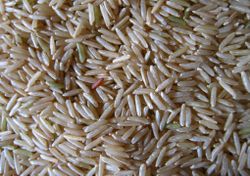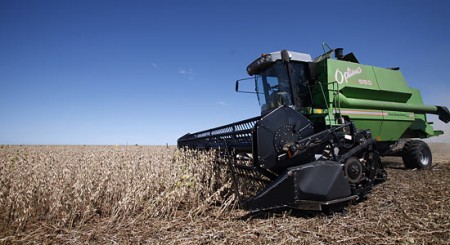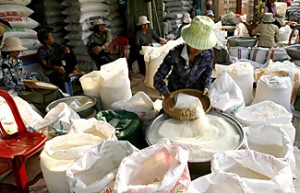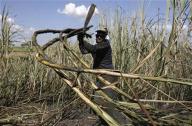A Guide to Preparing for Rising Food Costs or That Next Big Emergency

The inside of H-bomb steel shelter from 1955. (AP Photo)
Worried about the dramatically rising cost of food? Afraid of a shortage?
Well, then maybe it’s time to clean out that old Cold War-era bunker and stockpile your favorite treats. Just move those gas masks to the side and start stacking up the canned string beans.
OK, so maybe that is a bit extreme. But some families have been talking about stockpiling to hedge against further increases and possible shortages.
The idea took hold last week when Costco and Sam’s Club announced that they would limit customers to four wholesale-size 20-pound bags of imported jasmine, basmati and long-grain white rices per trip.
That has caused some concern, but think about the last time you bought 20 pounds of rice in one shopping trip, let alone 80, 100 or even 120 pounds.
How Is the Economy Treating You? Tell ABC News
(A Clever way to find out who is in financial trouble. – The Infinite Unknown)
The clubs’ restrictions were probably not aimed at everyday consumers, however.
In a statement Friday, Sam’s Club said: “These limits are designed to prevent large distributors or wholesalers from depleting our stock. We believe limiting rice purchases to four bags per visit is consistent with the needs of the majority of our members, including many restaurants.”
In other words, the big chains are afraid some restaurants will deplete their stocks because their prices are cheaper than some traditional restaurant suppliers.
Stockpiling Hurts Everyone
The reasons for the food price increases include more grains being used for fuel production, increased demand in countries including China, and poor harvests.
For consumers concerned about rising food prices, stockpiling probably makes little economic sense, said Bill Knudson, a professor in the Department of Agricultural Economics at Michigan State University.
“The thing about stockpiling is that it becomes a self-fulfilling prophecy,” he said. “The easiest way to raise food prices is if everybody went out and stockpiled food.”
(If everybody went out buying just 20% more food there would be empty shelves everywhere. And if you do not stock up food now, you will probably find yourself in big trouble very soon. This is a crisis played down.
– The Infinite Unknown
From recent articles:
“Even if people increased their purchasing by 20%, all the store shelves would be wiped out.”
…global grain reserves are “precarious,” at just 1.7 months of consumption, down from 3.5 months of reserves as recently as 2000.”…)
In the past two decades food prices have only increased by an average of 2.5 percent each year. But from 2006 to 2007, prices spiked 4 percent. The Department of Agriculture is forecasting a 4 to 5 percent increase in retail prices this year.
But some individual staples have jumped in price.
(Just some individual staples have jumped in price??? What a bad joke.- The Infinite Unknown)
The cost of white bread alone was 16.3 percent higher in March than a year earlier, according to the Labor Department’s Bureau of Labor Statistics, which tracks inflation through the Consumer Price Index. Grade A large eggs were up nearly 35 percent during the same period and sliced bacon rose 4.6 percent.
Read moreTime to Stockpile Food?








